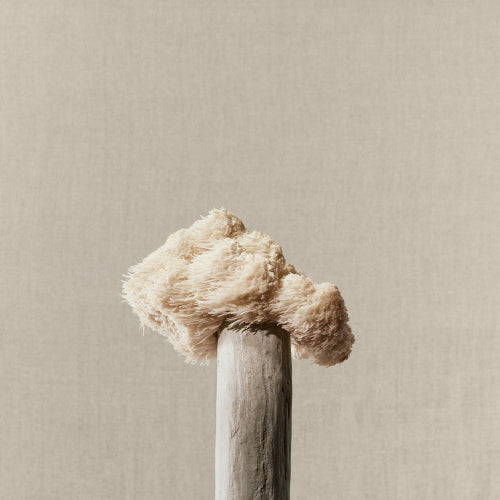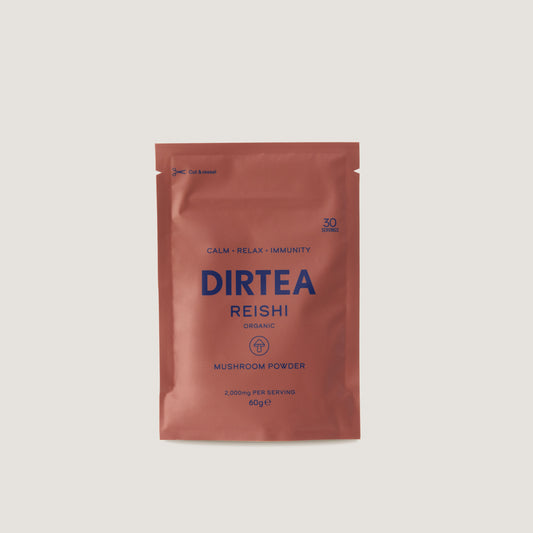Can Mushrooms Help with Anxiety? Reishi, Lion’s Mane and Other Natural Remedies Explained

Share
Can Mushrooms Help with Anxiety? Reishi, Lion’s Mane and Other Natural Remedies Explained
Anxiety disorders are now the most prevalent mental health condition worldwide. According to the World Health Organization, as of 2019, approximately 301 million people globally were living with an anxiety disorder—about 4% of the global population. Lifetime prevalence is even higher: nearly 30%–31% of adults will experience an anxiety disorder at some point in their lives.
According to SingleCare, between 1990 and 2021, global anxiety rates rose from about 3.7% to 4.4% of the world’s population.
In 2020—the first full year of the COVID-19 pandemic—cases of anxiety surged by nearly 25% worldwide, according to the World Health Organisation.
This rising anxiety clearly reflects modern pressures: global uncertainty, economic instability, environmental distress, social isolation, and digital overload.
What Is Anxiety & How Is It Treated?
Anxiety is a persistent feeling of worry, fear or dread that can be disproportionate to the actual situation. It may manifest as excessive worrying about everyday events (generalised anxiety disorder), panic attacks, social anxiety, or specific phobias.
Treatment typically includes a combination of:
-
Cognitive Behavioural Therapy (CBT) – first-line, evidence-based therapy that helps identify and reframe irrational thoughts and habits. Internet-delivered CBT (iCBT) works just as well as in-person sessions.
-
Psychopharmacology, including SSRIs, SNRIs and sometimes beta blockers.
-
Lifestyle adjustments include regular physical activity, sleep hygiene, reducing caffeine and alcohol, and stress-management techniques.
-
Other therapeutic modalities like emotion-focused therapy (EFT) and exposure therapy are effective, especially for social anxiety and specific phobias.
However, only about 27–28% of people living with anxiety disorders worldwide actually receive treatment, often due to stigma, lack of access or resources.
Mushrooms & Mushrooms-Derived Nutrients for Anxiety
Functional mushrooms have surged in popularity as adaptogens—plant-based compounds that help the body resist stress and balance its systems. Some of the best candidates for anxiety and mental resilience include Reishi, Lion’s Mane, and Cordyceps.
Reishi
Often referred to as the “mushroom of immortality” in traditional Eastern practices, Reishi has long been associated with calm, balance, and inner resilience. While scientific research is ongoing, it’s widely recognised for its unique bioactive compounds—such as beta-glucans and triterpenes—that have been explored for their potential role in supporting the body’s response to stress.
DIRTEA’s Calm Powder includes organic Vitamin B12, a nutrient that contributes to the normal function of the nervous system and helps support psychological balance. Together, Reishi and B12 make a soothing addition to your evening routine, especially during times of heightened tension or restlessness.
Lion’s Mane
Lion’s Mane is best known for its role in cognitive performance. Still, many people also find it helpful in supporting emotional clarity and mental balance—especially during busy or stressful periods. It contains naturally occurring compounds that have been studied for their interaction with the nervous system, including the gut-brain axis.
DIRTEA’s Focus Powder is infused with organic zinc, which contributes to normal cognitive function and protects cells from oxidative stress. It also contains Vitamins B5 and B12 in the Focus Gummies, supporting energy metabolism and the reduction of tiredness and fatigue—two important pillars when navigating emotional overwhelm or brain fog.
Cordyceps & Other Adaptogens
Cordyceps, while primarily associated with energy and performance, is also considered an adaptogen—a compound that helps the body adapt to physical and emotional stressors. When your energy feels depleted or your mood is low, supporting vitality can be an indirect yet impactful part of your overall mental wellness strategy.
DIRTEA’s Cordyceps Performance Powder and Gummies are also enriched with Vitamin B12, which supports normal psychological function and helps you feel more balanced throughout the day.
Vitamins, Nutrients, and Synergies
While mushrooms bring adaptogenic polysaccharides and unique bioactive compounds, combining them with traditional nutrients can be powerful:
-
B-vitamins (especially B6, B9, B12) support neurotransmitters like serotonin and GABA.
-
Vitamin D (mushrooms exposed to UV light are a natural source), which is often deficient, is linked to mood regulation.
-
Omega-3 fatty acids from fish oil or algae show moderate evidence of reducing anxiety symptoms.
-
Magnesium, L-theanine, and herbal adaptogens like ashwagandha further support stress resilience.
Many modern supplement formulas blend mushrooms, adaptogenic herbs, and vitamins to address anxiety more holistically.
Tools & Approaches to Manage Anxiety Alongside Therapy
While therapy (especially CBT) remains foundational, many complementary tools can empower people to manage anxiety proactively:
1. Lifestyle & Physical Activity
Being physically active reduces the risk and severity of anxiety. Regular exercise, stretching, or walking helps regulate mood, supports sleep, and lowers cortisol.
2. Sleep Hygiene & Caffeine Reduction
Poor sleep and excess caffeine can exacerbate anxiety cycles. Prioritising rest, dark bedrooms, and limiting stimulants is key.
3. Mindfulness, Meditation & Breathwork
Techniques like mindfulness, diaphragmatic breathing, progressive muscle relaxation, and guided imagery can reduce acute anxiety and support daily regulation.
4. Digital Tools & Virtual Reality
Digital CBT apps have early evidence of effectiveness. Self-guided VR-based therapeutic experiences have shown promise for social anxiety, public speaking, and phobias, with positive user experiences and retention rates
5. Peer Support & Community
Structured support groups, shared experiential learning, or eco-anxiety circles can provide emotional grounding and reduce shame or isolation.
6. Nutrition & Gut Health
A balanced diet rich in fibre, omega-3s, fermented foods, and antioxidants supports gut microbiome health, which is increasingly tied to mood and anxiety regulation.
7. Nature, Sunlight & Ecotherapy
Exposure to green spaces, sunlight (Vitamin D), and mindful outdoor time can significantly reduce daily stress levels.
Integrating Mushrooms into an Anxiety-Support Routine
Here’s a practical integrative approach for someone living with mild–to–moderate anxiety, using mushrooms alongside other tools (always after consulting with a licensed healthcare provider):
Morning
-
Start with Lion’s Mane powder to bring focus, clarity, and emotional balance.
-
Practice mindful breathing or a short meditation session.
Midday
-
Take short breaks (preferably movement-based) from work so you are not crashing before evening.
-
Eat omega-3 rich foods or supplements, and hydration.
Evening
-
A Reishi-based blend (or Reishi + ashwagandha) such as DIRTEA Cacao after dinner or a Reishi tea before bed can help support restful sleep and recovery.
-
Practice gentle yoga or breathing.
-
Avoid caffeine after mid-afternoon; keep screens low-blue light.
Weekly
-
Use a mindfulness app or attend an online CBT course for anxiety.
-
Experiment with self-guided VR exposures (e.g., virtual public speaking scenarios) to reduce social anxiety.
-
Join a peer or support group if eco-anxiety or life stress is building.
Monitoring
Track mood, anxiety severity, sleep quality, and energy over weeks to see if benefits emerge. Adjust protocols as recommended by a mental health professional.
Final Thoughts- Role of Lifestyle & Natural Supports
While therapy and medication are critical, many people benefit from complementary lifestyle practices—diet, movement, mindfulness, adaptogens—which can empower self-regulation and long-term resilience. Mushrooms fit into this integrative toolkit by offering adaptogenic compounds that support stress adaptation, cognitive wellness, and immune health—key foundations for feeling grounded.
FAQs
Can functional mushrooms really help with anxiety?
Functional mushrooms like Reishi and Lion’s Mane are known as adaptogens—natural compounds that help your body adapt to stress. Reishi may support a sense of calm and restfulness, while Lion’s Mane may help with mental clarity and emotional grounding.
While they aren’t a complete cure for anxiety, they can be valuable allies when combined with good sleep, a healthy lifestyle, and therapy.
What is the best mushroom for anxiety and stress?
Reishi is often considered the most calming mushroom. It’s traditionally used to aid sleep, and promote emotional balance. Lion’s Mane is another popular choice, especially if your anxiety is tied to brain fog or difficulty focusing. Both can be taken daily in powder and tea form as part of a broader wellness routine.
How long do mushrooms take to work for stress and anxiety?
Most adaptogenic mushrooms are not instant fixes. You may notice subtle changes in 2–4 weeks when used consistently, particularly if you pair them with lifestyle tools like breathwork, journaling, or gentle movement. Everyone responds differently, so it’s best to track your personal routine and progress.
Can I take mushroom supplements alongside medication or therapy?
Yes, many people use functional mushrooms to complement therapy, CBT, or prescribed medication. However, it’s important to speak with your GP, therapist, or healthcare provider before introducing new supplements—especially if you’re already on antidepressants or anti-anxiety medication.
Do DIRTEA mushroom blends contain vitamins for mental wellbeing?
Yes. DIRTEA’s mushroom powders and gummies are enhanced with science-backed vitamins that support mind-body balance. For example:
-
Reishi Calm Powder includes vitamin B12, which contributes to normal psychological function and the reduction of tiredness and fatigue.
-
Lion’s Mane Focus Powder contains zinc, which helps protect cells from oxidative stress and supports cognitive performance.
-
Focus Gummies blend Lion’s Mane with B5 and B12, known to reduce mental fatigue and support focus.
What’s the best time of day to take mushrooms for anxiety?
-
Reishi is ideal for the evening or bedtime, helping ease into rest.
-
Lion’s Mane works best in the morning or afternoon, offering grounding clarity and focus.
-
Pairing them with a mindful ritual—like a calming tea or journaling session—can enhance their effect.
Can lifestyle changes really make a difference with anxiety?
Absolutely. While therapy is crucial for many, daily tools like nutrition, movement, mindfulness, and natural supplements can empower people to manage anxiety holistically. Simple practices like reducing caffeine, improving sleep quality, or spending more time in nature can reduce anxiety symptoms over time.
Functional mushrooms may enhance these efforts, but they work best when combined with a comprehensive self-care approach.
Are mushroom supplements safe to take long-term?
Generally, yes—when sourced from high-quality, organic, and third-party tested producers. However, if you’re pregnant, breastfeeding, on medication, or managing a chronic condition, always speak to your healthcare provider first.
Are there side effects to taking functional mushrooms?
Most people tolerate functional mushrooms well. Start with a small dose, see how you get on, and build gradually.
Which DIRTEA product is best for supporting emotional balance and stress?
-
Reishi Calm Powder – ideal for night-time wind-downs and stress support.
-
Lion’s Mane Focus Powder – for clarity, memory, and a more grounded mood.
-
Focus Gummies – convenient daily support with B vitamins + Lion’s Mane.
These are not a substitute for therapy or clinical treatment, but they may help support a calmer mindset when used alongside other healthy habits.
References
- World Health Organization. (2023, September 13). Anxiety disorders. https://www.who.int/news-room/fact-sheets/detail/anxiety-disorders
- SingleCare. (2024). Anxiety statistics and facts in 2024. Retrieved from https://www.singlecare.com/blog/news/anxiety-statistics/
- World Health Organization. (2022, March 2). COVID-19 pandemic triggers 25% increase in prevalence of anxiety and depression worldwide. https://www.who.int/news/item/02-03-2022-covid-19-pandemic-triggers-25-increase-in-prevalence-of-anxiety-and-depression-worldwide














